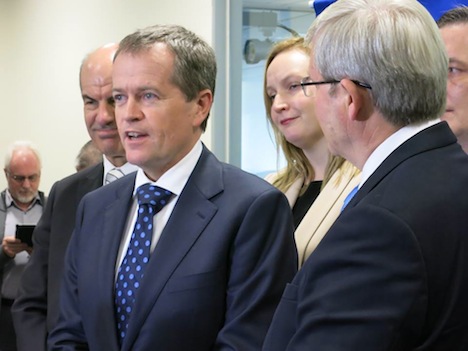Hardly a month after the Australian Labor Party lost its bid for a third consecutive term in power under former prime minister Kevin Rudd, Australia’s chief center-left party has a new leader — Bill Shorten.![]()
But Shorten, who won the leadership without the support of the party’s rank-and-file membership, will face an immediate showdown with prime minister Tony Abbott over scrapping Australia’s carbon pricing scheme, which in turn could lead to early ‘double dissolution’ elections within months that would favor Abbott’s Liberal Party (which governs in coalition with the National Party) — and that could see Labor switch leaders just as easily.
Shorten has his work cut out for him.
For now, however, the leadership victory caps a meteoric rise for Shorten (pictured above), who came to national prominence as the head of the Australian Worker’s Union between 2001 and 2007, when he was first elected to the House of Representatives on the wave that brought Rudd and Labor to power. As the AWU’s national secretary, Shorten attained national prominence for his role during the Beaconsfield mine collapse in Tasmania in 2006. Reelected in 2010, he was appointed minister for financial services and superannuation under prime minister Julia Gillard, and he took on the workplace relations portfolio in 2011. Shorten, who supported Gillard when Labor kicked Rudd out of office in June 2010, played a key role in backing Rudd in June 2013 when an increasingly desperate Labor Party caucus believed Gillard would lead them to an electoral disaster, and Shorten served for two and a half months under Rudd in 2013 as education minister.
But even under the more popular Rudd, Labor still lost the September 2013 elections, and the Coalition won a solid (if not quite landslide) victory, Gillard left parliament last June, and though Rudd was narrowly reelected in his Queensland district, no one expects him to play much of a role going forward — and if he follows the well-trod path of former prime ministers, Rudd will step down from parliament sometime within the next year.
Picking up the pieces of a defeated Labor Party — and facing down the conservative Abbott government — now falls to Shorten, who will benefit from a fairly united Labor Party supporting him. He certainly won’t face the toxic interpersonal, intraparty Rudd-Gillard schism that plagued Labor when it was in government, and new party rules adopted when Rudd most recently returned to the leadership mean that it will be especially difficult to remove Shorten from power.
In addition to the new rules for the leadership contest (described below), a 60% supermajority of the Labor parliamentary caucus (or 75% in government) is now required to remove a leader. That should slow Labor’s propensity to change leaders with such frequency — at least, unless Labor decides to change the rules to lower the threshold. The rules change dates not only from the poisonous Rudd-Gillard rivalry that so damaged Labor’s last stint in government — Labor went through five leadership changes the last time it was in opposition: former deputy prime minister Kim Beazley from 1996 to 2001, Simon Crean from 2001 to 2003, Mark Latham from 2003 to 2005, Beazley (again) from 2005 to 2006, and finally, Rudd until the successful 2007 election.
In the most recent leadership race, Shorten faced former deputy prime minister Anthony Albanese in Australia’s first dual leadership ballot — unlike prior leadership spills determined solely by the parliamentary caucus, the new rules require that the Labor caucus and the rank-and-file party membership hold dual votes — each vote has 50% weight in determining the final result.
That means that a leader can be elected despite losing a majority of the Labor caucus or of the Labor party membership and, sure enough, that’s what happened in the first contest under the new rules. While Shorten, traditionally Labor’s right wing, won 55 of the 86 Labor MPs (62.95% of the Labor caucus), Albanese, from Labor’s left wing, won 59.92% of the rank-and-file vote. So although Shorten lost the party membership by a wide margin, he won the combined vote with 52.02% due to his superior strength among Labor’s MPs. Continue reading Shorten set to lead Australian Labor through its wilderness period
